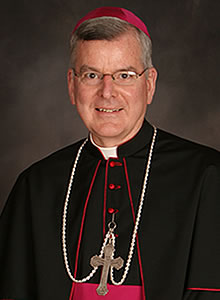
As I sit down to write this article, our state House and Senate stand ready to pass a budget for next year that the governor is sure to veto. The same kind of impasse is also being experienced in Washington, D.C., with no less willingness on the part of legislators to reach agreement on the fiscal year 2012 federal budget.
Obviously, both sides of the aisle face very difficult choices about how to balance needs and resources as well as how to allocate burdens and sacrifices. It is absolutely necessary for our nation to address the long-term impact of deficits on the health and stability of the economy, but how we do that is equally important.
Principles to follow
The “common good” would include such considerations as: fulfilling the demands of justice and moral obligations to future generations, controlling future debt and deficits, and protecting the lives and dignity of those who are poor and vulnerable.
Catholic moral teachings inspire the following principles that should serve as a guide for our input in discussing difficult budgetary decisions:
1) Human life and dignity: Every budget decision should be assessed as to whether or not it protects or threatens human life and the dignity of persons;
2) Priority for the poor: A central moral measure of any budget proposal is how it affects “the least of these” brothers and sisters (Matthew 25). The needs of the hungry, the homeless, the disabled and the unemployed should be primary in our considerations;
3) The common good: Government and other institutions have a shared responsibility to promote the common good of all members of our society, especially families who struggle to live with dignity during difficult economic times.
Armed with these principles, we must seek to find a just framework for a budget that does not rely on disproportionate cuts in essential services to poor persons. Those of us who are able must be willing to make shared sacrifices, including the raising of adequate revenues to pay our bills, eliminating unnecessary military expenses, and addressing in a fair, effective and realistic way the long-term costs of health insurance and retirement programs.
On the other hand, those who receive benefits from the commonwealth must not forget their responsibility to society in return.
Doing better
I encourage our readers to study the present issues in light of the principles set forth by our Catholic faith, and then to contact their elected representatives on both the state and federal levels, encouraging them to craft budgets that are just and fair, especially to the most vulnerable among us.
In a meeting this week with Tim Marx, our new archdiocesan CEO of Catholic Charities, I learned of another compelling reason for not fixing the budget on the backs of the poor — which is that habitual and widespread poverty is bad fiscal policy and bad economic policy.
A failure to address the basic needs in housing, food, health care as well as the need for children to begin life with a healthy start will, in the long-run, require more costs in services as well as result in reduced productivity.
I know we can do better. I pray that all parties can come together to make the right decisions to steer us on a course, as a state and as a nation, of which we can all be proud.
God love you!



